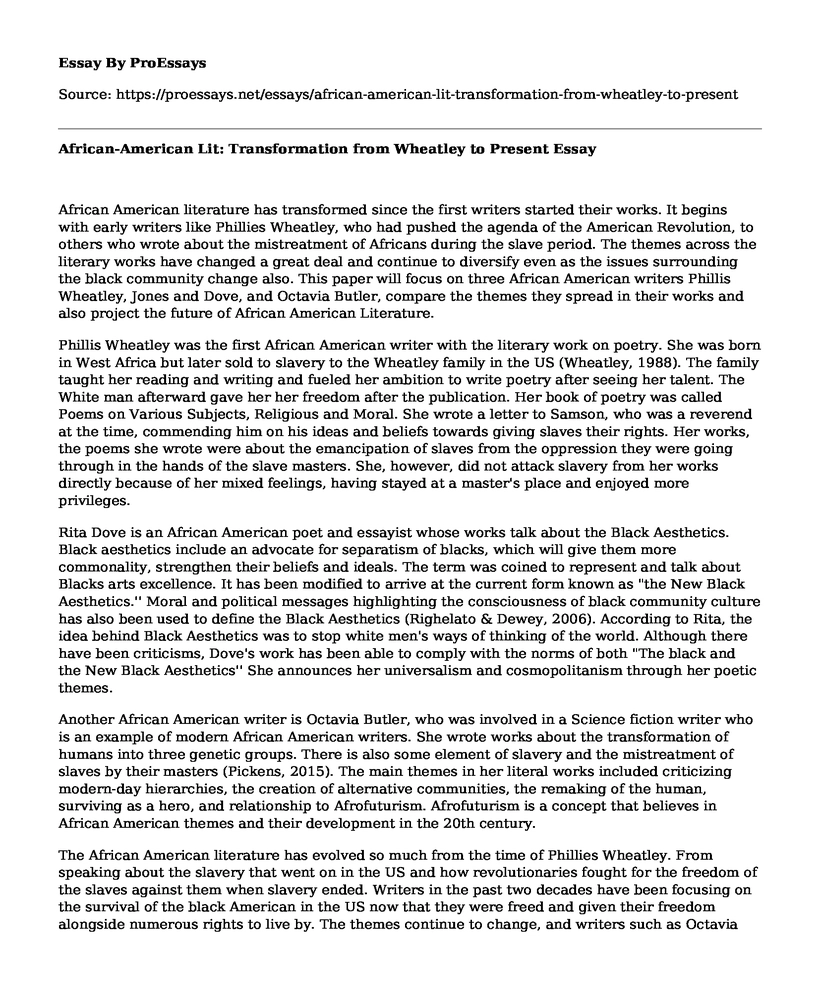African American literature has transformed since the first writers started their works. It begins with early writers like Phillies Wheatley, who had pushed the agenda of the American Revolution, to others who wrote about the mistreatment of Africans during the slave period. The themes across the literary works have changed a great deal and continue to diversify even as the issues surrounding the black community change also. This paper will focus on three African American writers Phillis Wheatley, Jones and Dove, and Octavia Butler, compare the themes they spread in their works and also project the future of African American Literature.
Phillis Wheatley was the first African American writer with the literary work on poetry. She was born in West Africa but later sold to slavery to the Wheatley family in the US (Wheatley, 1988). The family taught her reading and writing and fueled her ambition to write poetry after seeing her talent. The White man afterward gave her her freedom after the publication. Her book of poetry was called Poems on Various Subjects, Religious and Moral. She wrote a letter to Samson, who was a reverend at the time, commending him on his ideas and beliefs towards giving slaves their rights. Her works, the poems she wrote were about the emancipation of slaves from the oppression they were going through in the hands of the slave masters. She, however, did not attack slavery from her works directly because of her mixed feelings, having stayed at a master's place and enjoyed more privileges.
Rita Dove is an African American poet and essayist whose works talk about the Black Aesthetics. Black aesthetics include an advocate for separatism of blacks, which will give them more commonality, strengthen their beliefs and ideals. The term was coined to represent and talk about Blacks arts excellence. It has been modified to arrive at the current form known as "the New Black Aesthetics.'' Moral and political messages highlighting the consciousness of black community culture has also been used to define the Black Aesthetics (Righelato & Dewey, 2006). According to Rita, the idea behind Black Aesthetics was to stop white men's ways of thinking of the world. Although there have been criticisms, Dove's work has been able to comply with the norms of both "The black and the New Black Aesthetics'' She announces her universalism and cosmopolitanism through her poetic themes.
Another African American writer is Octavia Butler, who was involved in a Science fiction writer who is an example of modern African American writers. She wrote works about the transformation of humans into three genetic groups. There is also some element of slavery and the mistreatment of slaves by their masters (Pickens, 2015). The main themes in her literal works included criticizing modern-day hierarchies, the creation of alternative communities, the remaking of the human, surviving as a hero, and relationship to Afrofuturism. Afrofuturism is a concept that believes in African American themes and their development in the 20th century.
The African American literature has evolved so much from the time of Phillies Wheatley. From speaking about the slavery that went on in the US and how revolutionaries fought for the freedom of the slaves against them when slavery ended. Writers in the past two decades have been focusing on the survival of the black American in the US now that they were freed and given their freedom alongside numerous rights to live by. The themes continue to change, and writers such as Octavia Butler have written about the way African American themes and wellbeing can be incorporated in the systems. In the future, the themes in many of the texts will be about the fight of racism that is not only practiced in the US but also in many countries the world over. The pandemic has even exposed the conditions of black people in the US due to the discrimination they cannot access healthcare, and authors have a wide range of themes to write about.
References
Pickens, T. A. (2015). Octavia Butler and the Aesthetics of the Novel. Hypatia, 30(1), 167-180.
Righelato, P., & Dewey, J. (2006). Understanding Rita Dove. Univ of South Carolina Press.
Wheatley, P. (1988). The collected works of Phillis Wheatley. Schomburg Library of Nineteenth-Century Black Women Writers.
Cite this page
African-American Lit: Transformation from Wheatley to Present. (2023, Jul 24). Retrieved from https://proessays.net/essays/african-american-lit-transformation-from-wheatley-to-present
If you are the original author of this essay and no longer wish to have it published on the ProEssays website, please click below to request its removal:
- Prenatal Care for Pregnant Women
- North Texas Food Bank Paper Example
- Bariatric Surgery Manual Paper Example
- Essay on Explore the Bustling City of Atlanta: 2018 Population, Economy, and Culture
- National Right to Life Committee: Protecting Life in America - Essay Sample
- Essay Example on Japan's Aggression: War in the Pacific 1930s-WWII
- Essay Sample on Assessing Patient Cases: Depression, Dementia, Adoption, and Substance Abuse







